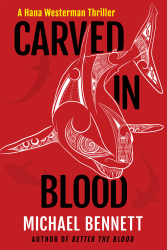
When Detective Inspector Jaye Hamilton stops at an Auckland liquor store for a bottle of champagne, it is supposed to be his daughter Addison has just gotten engaged. Instead, he is suddenly gunned down at the register by a balaclava-clad assailant in what appears at first to be a random act. The getaway car is quickly recovered, containing the cell phone of a young Māori man, Toa Davis, who is immediately the object of an all-out police search.
Jaye’s ex-wife, former Māori detective Hana Westerman, asks in on the investigation. Her instincts suggest that the vehicle was meant to be found, and that Jaye had been targeted. The gun used in the assault is distinctive, and she learns that a local gang leader, Erwin Rendall—who had threatened Hana in the past—owns such a weapon. When Davis turns up dead, the hunt for Rendall is on. Yet when Rendall slips through the dragnet and escapes the country, and in the wake of Jaye’s death, Hana decides to rejoin the force, acknowledging that she has unfinished business still.
Carved in Blood, Michael Bennett
The dedication in CARVED IN BLOOD is to Mark Bennett (2nd April, 1950 - 20th October, 2024) and Bruce Bennett (20th March, 1953 - 1st February, 2025). Shine bright among the stars, big brothers.
In many ways, this sad dedication, coupled with the moving tribute in the novel's Acknowledgements describing how the great waka with its prow formed by the nine stars of Matariki, from which the navigator, threw out his net, to pick up the author's brothers expands on a theme that ran through the novel. Matariki is the Māori name for the Seven Sisters, or Pleiades star cluster, the rising of which in late June / early July in New Zealand marks the beginning of the Māori lunar calendar, and that event, and an approach to family - chosen and blood, relationships, culture, land and death, weaves its way gently, contemplatively through what is otherwise a confrontational story in CARVED IN BLOOD.
Sidenote: this really is a series that you should read from the start, in order. Each novel BETTER THE BLOOD, then RETURN TO BLOOD does standalone well, but the connections and pasts of central character Hana, her father Eru, ex-husband Jaye, and their daughter Addison, as well as Jaye's new family are a big part of the attraction of this series, as are the plots steeped in sense of people, place and culture.
This one has another one of those informative plots at its heart, unfortunately centring around DI Jaye Hamilton, who in the process of planning a celebration for Addison's upcoming engagement, is gunned down in an Auckland liquor store, with police immediately targeting a young Māori man as their main suspect, based on the quick recovery of the getaway car, and his mobile phone. The problem for police is they know who they are after, just not where he is, despite an extensive search, and a large police team, including seconded back to duty, temporary police officer Hana Westerman. Even with the evidence pointing straight at Toa Davis, Hana has a spidery sense that there's something more here, and whilst she and Jaye's second wife maintain a vigil beside Jaye's hospital bed, Hana's feeling that he was targeted, rather than wrong place / wrong time, continues to grow.
Balanced carefully with this police investigation is that sense of a family pulling together, and a culture that is strong despite ongoing oppression. Bennett at no point pulls back from exploring the beauty of Māori symbolism, or the brutality of racism. It's not preachy, or heavy handed, the matter-of-factness is often more confronting, as Gracie, girlfriend of Tao Davis, puts it when being interviewed by Hana and her temporary boss:
If anyone should know how hard it is for brown people at the bottom of the pile, it's two fucking brown women. You should be ashamed.
DI Williams and Hana Westerman are ashamed, but they are also determined to prove their case, and furious when they start to find threads that mean the manipulation of their main suspect is real, and the likely culprit is a lot more dangerous than they would ever have dreamed. Even without access to the few chapters written here from the sick, perverted, perpetrator's viewpoint, this is a person that on one hand Hana would compare with the mako sharks she's encountered in the ocean near her "The eyes. Cold. Emotionless". Then again she knows that's not fair, sharks have reasons for being where and what they are.
Hana is dealing with a lot again in this novel: the fallout from Jaye's shooting, her daughter and Jaye's wife and stepchildren's anguish; a hesitant and messy romantic possibility, and her father's health setback. As well as a directionless life that now threatens to overwhelm her since she left the police force, post the traumatic events covered in the first novel.
At it's heart, this is a police procedural series, built on great characterisations, with a central theme of the affects of crime that ripple outwards in this community of proud First Nations peoples. There is great strength in the glimpses the novels provide into a way of life, and thinking that is different, and yet not. The novels are built around people from an unfairly oppressed culture who have found pride in who they are, where they came from, and where they are going.